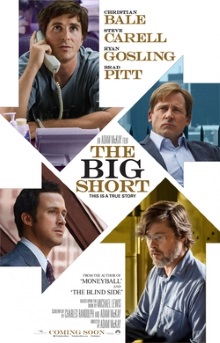
Margin Call was one of my favorite films in the year of its release and to this day it’s one of the first things that come to my mind whenever I think of good examples of cinema that try to cover current events. It helps as well that the subject of the financial crisis of 2007 to 2008 is personally very fascinating to me as a key challenge to modern capitalism. Arguably we can even detect the seeds of the rise of illiberalism that we see everywhere today in that crisis as the economic damage that it did to the working classes was never fully repaired. So it makes sense that I was highly interested in this adaptation of the famous book by Michael Lewis about what is known as the worst recession since the Great Depression.
The Big Short tells three separate stories about traders who realized that the U.S. housing market was about to go bust and that consequently a huge fortune could be made from shorting it. The first one is Michael Burry, the manager of an unorthodox hedge fund, who starting making these bets as early as 2005. This raises the ire of his investors that he was wasting their capital as the housing market is generally considered to be rock solid. Mark Baum who runs a small independent unit within Morgan Stanley learns of these trades through a misplaced phone call and sends his staff to investigate failing mortgages in Miami. Finally two young investors Charlie Geller and Jamie Shipley get in on the trade as well with their small firm. Their low capital get them laughed out of the major investment banks but they enlist the aid of an experienced but retired trader Ben Rickert to get them a seat at the big table.
The three stories never intersect. Though both of the other two teams make their bets because they get wind of Burry’s trades one way or another, they never meet one another. Still, all three combine to provide multiple points of view. Burry bases his convictions on raw data and his story focuses on how, having made his bet too early, he tenaciously hangs while the value of his fund dives due to the premiums that he has to pay, causing his investors to desert and forcing him to let go of his staff. Baum is something of a moralistic crusader who is convinced that the financial system is broken. But as he talks to the agents who sell the houses, the owners who buy them and the bank officers who write the loans, even he is shocked at how the whole edifice is built on a house of cards of false documentation and lies. Geller and Shipley are the outsiders who have always looked forward to joining the big leagues but are disappointed to find that even the big name bankers act like irresponsible children.
To help explain the complex financial instruments that are involved, director Adam McKay makes use of celebrity cameos. So chef Anthony Bourdain likens poor quality, unsold mortgages that bundled into CDOs that are considered diversified to old fish that are used to make stew and Selena Gomez helps economist Richard Thaler explain what synthetic CDOs are. This fourth wall breaking extends to the characters as well with for example Geller and Shipley remarking that they didn’t really come across Burry’s strategy by happening on a discarded brochure in the lobby of the bank but filming it that way makes for a more entertaining film. Like in Deadpool, this has the effect of giving the film a comedic tone. That may seem incongruous given the gravity of the crisis but let’s face it, a lot of the appeal of this film is in the schadenfreude of proving all that greedy bankers and real estate agents wrong and so this is exactly the right tone to take. It’s certainly a good way of rendering what would otherwise be a very difficult subject to tackle palatable to a wider audience.
Overall I found The Big Short to be less like a dramatic film and more like a documentary reenactment of the financial crisis. The dialogue is plenty entertaining but is way too on the nose to be realistic. For all that Brad Pitt as the jaded Rickert cautions that the precipitous dive in the markets has serious repercussions on millions of ordinary people, there is little real emotion here. That’s why I would consider Margin Call to be the better film due to how it manages to get at the psychologies of the characters involved. At the same time, I wouldn’t sell this one short. It’s an excellent and entertaining examination of the causes behind the crisis and should be required watching for anyone who cares about world affairs.